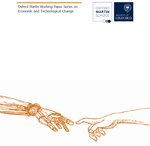The Oxford Martin Programme on
the Future of Work

The Challenge
The 21st century has already brought astonishing technological achievements. From smartphones to internet shopping, our lives are transformed in many ways, and the world of work is affected in particularly dramatic ways.
Yet these changes are not always positive, and any benefits are not always widely shared. This programme, with the support of Citi, is investigating the implications of a rapidly changing technological landscape for economies and societies.
The programme will provide an in-depth understanding of how technology is transforming the economy, to help leaders create a successful transition into new ways of working in the 21st Century.
The programme will provide novel and relevant evidence on:
- How technology is transforming companies and industries;
- Why some places are better at adapting to this transformation;
- Related implications for living standards, inequality and social mobility.
The Oxford Martin Programme on the Future of Work is part of a research partnership between the Oxford Martin School and Citi, analysing some of the most pressing global challenges of the 21st Century. As well as collaborating on research, the Oxford Martin School and Citi are publishing joint Citi Global Perspectives & Solutions (Citi GPS) reports, most recently Technology at Work v7.0.

ROBOT-PROOF
Long Read - June 2019
When it comes to the capabilities of intelligent machines we've seen nothing yet, says Dr Carl Benedikt Frey.
So how can we prepare future generations for a very different world of work?
Read

Research
Technology & Work
Just as industrial robots have changed the nature of manufacturing, big data and smart machines are now transforming a wide range of industries and occupations.
We are researching the broader trends, as well as the effect on specific industries and companies.
Technology & Structural Transformation
The team is investigating why some places are better at adapting to the transformation of industries and occupations.
We examine why some cities and nations have successfully managed the renewal process, while others have not.
Technology & Inclusive Growth
Throughout history, technological progress has delivered growing incomes and higher standards of living for many. Yet technology is increasingly displacing workers.
We seek to understand how technology impacts on growth, inequality and social mobility.
Technequality
Working with the Technological and Economic Change programme, the team is part of a consortium to understand how technological innovations impact the size and nature of inequalities and labour market outcomes in the EU. This Horizon 2020 project will also assess policies to reduce technology driven inequalities.

featured blog
Automation and the future of work – understanding the numbers
In 2013, we published a paper entitled “The Future of Employment: How Susceptible Are Jobs to Computerisation?”, estimating that 47% of U.S. jobs are at risk of automation. Since then, numerous studies have emerged, arriving at very different conclusions. Many policymakers naturally find it hard to make sense of these results. Which study is right? And why do they arrive at very different conclusions? In this article, we shall seek to explain why these estimates diverge.
news
View allOxford Martin researchers contribute to Citi report on ageing populations
Healthy ageing, preventive healthcare, labour market reform, and financial resilience planning are all potential approaches to support a global population that is older than it has ever been, says a Citi report developed with Oxford Martin School involvement.
Oxford Martin skills report shapes Polish youth school
In 2016, the Oxford Martin School collaborated with learning company Pearson and innovation foundation Nesta to provide a report offering new insights and evidence about the skills and competencies that would be required for businesses, governments, and education experts in 2030.
Remote collaborations deliver fewer scientific breakthroughs, says Oxford Martin research
Remote teams are less likely to make breakthrough discoveries compared to those who work onsite, according to research led by the universities of Oxford and Pittsburgh into the rise of remote collaborations among scientists and inventors across the world.
Jobs will be automated, but not because of the latest Generative AI
Everyone is worried about Artificial Intelligence. From writers in Hollywood to computer programmers, recent advances in technology are causing concern about what Generative AI is going to mean for the future of work, our society and the wider world. Is there nothing machines will not be able to do?
Publications
View all
Who Governs Climate Change? Business Interests and the American Clean Energy and Security Act

Lost in translation: AI’s impact on translators and foreign language skills

Lost in Translation: Artificial Intelligence and the Demand for Foreign Language Skills

Redirecting AI: Privacy regulation and the future of artificial intelligence

Embracing Demographic Transition Health and Wealth in an Aging World

Robots and reshoring: a comparative study of automation, trade, and employment in Europe
Keep in touch
If you found this page useful, sign up to our monthly digest of the latest news and events
Subscribe